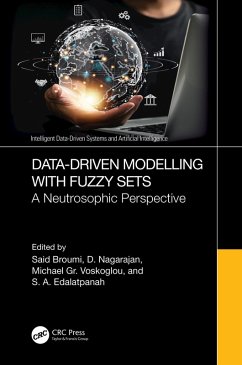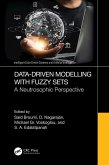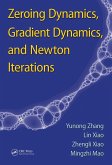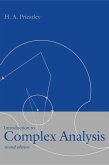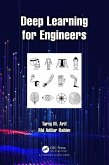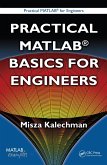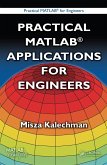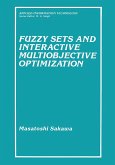Data-Driven Modelling with Fuzzy Sets (eBook, PDF)
A Neutrosophic Perspective
Redaktion: Broumi, Said; Edalatpanah, S. A.; Voskoglou, Michael Gr.; Nagarajan, D.
52,95 €
52,95 €
inkl. MwSt.
Sofort per Download lieferbar

26 °P sammeln
52,95 €
Als Download kaufen

52,95 €
inkl. MwSt.
Sofort per Download lieferbar

26 °P sammeln
Jetzt verschenken
Alle Infos zum eBook verschenken
52,95 €
inkl. MwSt.
Sofort per Download lieferbar
Alle Infos zum eBook verschenken

26 °P sammeln
Data-Driven Modelling with Fuzzy Sets (eBook, PDF)
A Neutrosophic Perspective
Redaktion: Broumi, Said; Edalatpanah, S. A.; Voskoglou, Michael Gr.; Nagarajan, D.
- Format: PDF
- Merkliste
- Auf die Merkliste
- Bewerten Bewerten
- Teilen
- Produkt teilen
- Produkterinnerung
- Produkterinnerung

Bitte loggen Sie sich zunächst in Ihr Kundenkonto ein oder registrieren Sie sich bei
bücher.de, um das eBook-Abo tolino select nutzen zu können.
Hier können Sie sich einloggen
Hier können Sie sich einloggen
Sie sind bereits eingeloggt. Klicken Sie auf 2. tolino select Abo, um fortzufahren.

Bitte loggen Sie sich zunächst in Ihr Kundenkonto ein oder registrieren Sie sich bei bücher.de, um das eBook-Abo tolino select nutzen zu können.
In this book, the authors delve into the theories and advancements in the field of neutrosophic sets. The book explores the extensive applications of neutrosophic sets, ranging from neutrosophic graphs to single-valued trapezoidal neutrosophic sets, and their practical implications in knowledge management.
- Geräte: PC
- mit Kopierschutz
- eBook Hilfe
Andere Kunden interessierten sich auch für
![Data-Driven Modelling with Fuzzy Sets (eBook, ePUB) Data-Driven Modelling with Fuzzy Sets (eBook, ePUB)]() Data-Driven Modelling with Fuzzy Sets (eBook, ePUB)52,95 €
Data-Driven Modelling with Fuzzy Sets (eBook, ePUB)52,95 €![Zeroing Dynamics, Gradient Dynamics, and Newton Iterations (eBook, PDF) Zeroing Dynamics, Gradient Dynamics, and Newton Iterations (eBook, PDF)]() Yunong ZhangZeroing Dynamics, Gradient Dynamics, and Newton Iterations (eBook, PDF)157,95 €
Yunong ZhangZeroing Dynamics, Gradient Dynamics, and Newton Iterations (eBook, PDF)157,95 €![Introduction to Complex Analysis (eBook, PDF) Introduction to Complex Analysis (eBook, PDF)]() H. A. PriestleyIntroduction to Complex Analysis (eBook, PDF)31,95 €
H. A. PriestleyIntroduction to Complex Analysis (eBook, PDF)31,95 €![Deep Learning for Engineers (eBook, PDF) Deep Learning for Engineers (eBook, PDF)]() Tariq M. ArifDeep Learning for Engineers (eBook, PDF)52,95 €
Tariq M. ArifDeep Learning for Engineers (eBook, PDF)52,95 €![Practical MATLAB Basics for Engineers (eBook, PDF) Practical MATLAB Basics for Engineers (eBook, PDF)]() Misza KalechmanPractical MATLAB Basics for Engineers (eBook, PDF)89,95 €
Misza KalechmanPractical MATLAB Basics for Engineers (eBook, PDF)89,95 €![Practical MATLAB Applications for Engineers (eBook, PDF) Practical MATLAB Applications for Engineers (eBook, PDF)]() Misza KalechmanPractical MATLAB Applications for Engineers (eBook, PDF)84,95 €
Misza KalechmanPractical MATLAB Applications for Engineers (eBook, PDF)84,95 €![Fuzzy Sets and Interactive Multiobjective Optimization (eBook, PDF) Fuzzy Sets and Interactive Multiobjective Optimization (eBook, PDF)]() Masatoshi SakawaFuzzy Sets and Interactive Multiobjective Optimization (eBook, PDF)113,95 €
Masatoshi SakawaFuzzy Sets and Interactive Multiobjective Optimization (eBook, PDF)113,95 €-
-
-
In this book, the authors delve into the theories and advancements in the field of neutrosophic sets. The book explores the extensive applications of neutrosophic sets, ranging from neutrosophic graphs to single-valued trapezoidal neutrosophic sets, and their practical implications in knowledge management.
Dieser Download kann aus rechtlichen Gründen nur mit Rechnungsadresse in A, B, BG, CY, CZ, D, DK, EW, E, FIN, F, GR, HR, H, IRL, I, LT, L, LR, M, NL, PL, P, R, S, SLO, SK ausgeliefert werden.
Produktdetails
- Produktdetails
- Verlag: Taylor & Francis eBooks
- Seitenzahl: 234
- Erscheinungstermin: 3. Juli 2024
- Englisch
- ISBN-13: 9781040041581
- Artikelnr.: 72389063
- Verlag: Taylor & Francis eBooks
- Seitenzahl: 234
- Erscheinungstermin: 3. Juli 2024
- Englisch
- ISBN-13: 9781040041581
- Artikelnr.: 72389063
- Herstellerkennzeichnung Die Herstellerinformationen sind derzeit nicht verfügbar.
Said Broumi is serving as an associate assistant professor at the Regional Center for the Professions of Education and Training, Casablanca-Settat, Morocco. Dr. Broumi completed his MSc and PhD in computer science from University of Hassan II in Casablanca. He is a permanent member of the Laboratory of Information Processing, Faculty of Science Ben M'Sik, University Hassan II. His research interests are graph theory, extended fuzzy graphs, decision analysis, and neutrosophic theory. He has published diverse works on neutrosophic graph theory, soft set theory, multiattribute decision analysis, and some alternative theories of neutrosophic mathematics. He has published more than 200 research articles in international peer-reviewed ISI indexed /impact factor journals. Some of his papers have been published in high-impact journals including Complex & Intelligent Systems , Computational and Applied Mathematics , Symmetry , and Journal of Neutrosophic Set and Systems . His work has been cited more than 5,992 times (Scholar Google, H-index 41). He has presented his research work at some international as well as national conferences. He is a reviewer for a number of international journals and He is also an editor-in-chief of Neutrosophic Set and Systems and International Journal of Neutrosophic Science. D. Nagarajan is a professor in the Department of Mathematics, Rajalakshmi Institute of Technology, Chennai, India. He received his Ph.D. from Manonmaniam Sundaranar University in 2007. He has a total of 23 years of experience in both academia and research international as well as national institutions. He has published 110 research articles in international reputed journals as well as serving as a reviewer for many peer-reviewed journals. He has two patents to his credit. His research interests include stochstic processes, fuzzy sets and system, neutrosophic control systems and image processing. He is also associated with various educational and research societies, like IMS, ISTE, IAENG, AMTI and ISRD. He is the guest editor of three journals and coauthor of three books published by Lambert and Notion Press. He is also associate editor of Franklin Open. Michael Gr. Voskoglou (B.Sc., M.Sc., M.Phil., Ph.D. in Mathematics) is an emeritus professor of mathematical sciences at the School of Engineering of the Graduate Technological Educational Institute of Western Greece, which has recently been joined with the University of Peloponnese. He was a full professor at the same Institute from 1987 to 2010. He was also an instructor at the Hellenic Open University, in the mathematics department of the University of Patras, and at the Schools of Primary and Secondary In-Service Teachers' Training in Patras and a teacher of mathematics at the Greek Public Secondary Education (1972-1987). He worked as a visiting researcher at the Institute of Mathematics and Informatics of the Bulgarian Academy of Sciences in Sofia for three years (1997-2000), under sabbatical. He has lectured as a visiting professor in postgraduate courses at the School of Management of the University of Warsaw (2009), in the Department of Operational Mathematics of the University of Applied Sciences in Berlin (2010) and in the Mathematics Department of the National Institute of Technology of Durgapur (2016) under a grant of the Indian government. He is the author/editor of 18 books in Greek and in English and of more than 600 papers published in international journals, book chapters, and conference proceedings in more than 30 countries on five continents, with more than 2000 citations from other researchers. He used to be the Editor in Chief of the International Journal of Applications of Fuzzy Sets and Artificial Intelligence (2011-2020), and currently he is a reviewer for the American Mathematical Society, Editor in Chief of Construction, Design, Maintenance (www.wseas.com/journals/dcm/index.php) and member of the editorial boards of many other international scientific journals. He has conducted five programs of technological research on applications of quantitative methods to management (1989-1997), he has supervised many student dissertations, and he was an external examiner of Ph.D. dissertations at Universities of Egypt, India and Saudi Arabia. He is the recipient of many scholarships, distinctions, and honorary awards and a member of many scientific associations (AMS, HMS, ICTMA, IETI, etc.). His research interests include algebra, fuzzy logic, Markov chains, artificial intelligence, and mathematics education. S. A. Edalatpanah is an associate professor at the Ayandegan Institute of Higher Education, Tonekabon, Iran. Dr. Edalatpanah received his Ph.D. in applied mathematics from the University of Guilan, Rasht, Iran. He is currently working as the Chief of R&D at the Ayandegan Institute. He is also an academic member of Guilan University and the Islamic Azad University of Iran. Dr. Edalatpanah's fields of interest include numerical computations, operational research, uncertainty, fuzzy set and its extensions, numerical linear algebra, soft computing, and optimization. He has published over 150 journal and conference proceedings papers in these research areas. He serves on the editorial boards of several international journals. He is also the Director-in-Charge of Journal of Fuzzy Extension & Applications. Currently, he is president of the International Society of Fuzzy Set Extensions and Applications.
1. Applications of Neutroscopic Sets in Science, Humanity and Education. 2.
First Order Non Homogeneous Ordinary Differential Equation with Initial
Value Condition under Pentagonal Neutrosophic Number Environment. 3.
Analysis of M/M/c Queue with Linguistic Single Valued Neutrosophic logic
using Parametric Nonlinear Programming. 4. A Study on Cardinalities of the
Neutrosophic Set and Neutrosophic Crisp Set. 5. A Study on the Systems of
Neutrosophic Cylindrical Coordinates. 6. Application of Interval Quadri
partitioned Single Valued Neutrosophic Sets to Graphs and Climatic
Analysis. 7. Neutrosophic Submodule of Direct sum. 8. Quota harvesting
logistic growth model:A neutrosophic differential equation approach. 9.
Pentapartitioned Neutrosophic Dombi Weighted Aggregation Operator for MADM.
10. A Novel Technique of Neutrosophic Mayor-Torrens Hybrid Aggregation
operator in Multi-Criteria Decision Making. 11. Similarity Measures of
Fermatean Neutrosophic Sets based on the Euclidean Distance.
First Order Non Homogeneous Ordinary Differential Equation with Initial
Value Condition under Pentagonal Neutrosophic Number Environment. 3.
Analysis of M/M/c Queue with Linguistic Single Valued Neutrosophic logic
using Parametric Nonlinear Programming. 4. A Study on Cardinalities of the
Neutrosophic Set and Neutrosophic Crisp Set. 5. A Study on the Systems of
Neutrosophic Cylindrical Coordinates. 6. Application of Interval Quadri
partitioned Single Valued Neutrosophic Sets to Graphs and Climatic
Analysis. 7. Neutrosophic Submodule of Direct sum. 8. Quota harvesting
logistic growth model:A neutrosophic differential equation approach. 9.
Pentapartitioned Neutrosophic Dombi Weighted Aggregation Operator for MADM.
10. A Novel Technique of Neutrosophic Mayor-Torrens Hybrid Aggregation
operator in Multi-Criteria Decision Making. 11. Similarity Measures of
Fermatean Neutrosophic Sets based on the Euclidean Distance.
1. Applications of Neutroscopic Sets in Science, Humanity and Education. 2.
First Order Non Homogeneous Ordinary Differential Equation with Initial
Value Condition under Pentagonal Neutrosophic Number Environment. 3.
Analysis of M/M/c Queue with Linguistic Single Valued Neutrosophic logic
using Parametric Nonlinear Programming. 4. A Study on Cardinalities of the
Neutrosophic Set and Neutrosophic Crisp Set. 5. A Study on the Systems of
Neutrosophic Cylindrical Coordinates. 6. Application of Interval Quadri
partitioned Single Valued Neutrosophic Sets to Graphs and Climatic
Analysis. 7. Neutrosophic Submodule of Direct sum. 8. Quota harvesting
logistic growth model:A neutrosophic differential equation approach. 9.
Pentapartitioned Neutrosophic Dombi Weighted Aggregation Operator for MADM.
10. A Novel Technique of Neutrosophic Mayor-Torrens Hybrid Aggregation
operator in Multi-Criteria Decision Making. 11. Similarity Measures of
Fermatean Neutrosophic Sets based on the Euclidean Distance.
First Order Non Homogeneous Ordinary Differential Equation with Initial
Value Condition under Pentagonal Neutrosophic Number Environment. 3.
Analysis of M/M/c Queue with Linguistic Single Valued Neutrosophic logic
using Parametric Nonlinear Programming. 4. A Study on Cardinalities of the
Neutrosophic Set and Neutrosophic Crisp Set. 5. A Study on the Systems of
Neutrosophic Cylindrical Coordinates. 6. Application of Interval Quadri
partitioned Single Valued Neutrosophic Sets to Graphs and Climatic
Analysis. 7. Neutrosophic Submodule of Direct sum. 8. Quota harvesting
logistic growth model:A neutrosophic differential equation approach. 9.
Pentapartitioned Neutrosophic Dombi Weighted Aggregation Operator for MADM.
10. A Novel Technique of Neutrosophic Mayor-Torrens Hybrid Aggregation
operator in Multi-Criteria Decision Making. 11. Similarity Measures of
Fermatean Neutrosophic Sets based on the Euclidean Distance.
